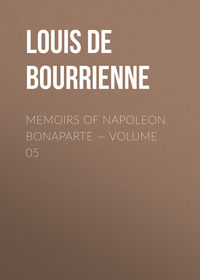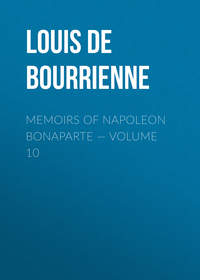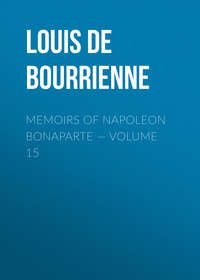 полная версия
полная версияMemoirs of Napoleon Bonaparte — Complete
Bonaparte, on hearing the details which the French Consul communicated, resolved to disembark immediately. Admiral Brueys represented the difficulties and dangers of a disembarkation—the violence of the surge, the distance from the coast,—a coast, too, lined with reefs of rocks, the approaching night, and our perfect ignorance of the points suitable for landing. The Admiral, therefore, urged the necessity of waiting till next morning; that is to say, to delay the landing twelve hours. He observed that Nelson could not return from Syria for several days. Bonaparte listened to these representations with impatience and ill-humour. He replied peremptorily, "Admiral, we have no time to lose. Fortune gives me but three days; if I do not profit by them we are lost." He relied much on fortune; this chimerical idea constantly influenced his resolutions.
Bonaparte having the command of the naval as well as the military force, the Admiral was obliged to yield to his wishes.
I attest these facts, which passed in my presence, and no part of which could escape my observation. It is quite false that it was owing to the appearance of a sail which, it is pretended, was descried, but of which, for my part, I saw nothing, that Bonaparte exclaimed, "Fortune, have you abandoned me? I ask only five days!" No such thing occurred.
It was one o'clock in the morning of the 2d of July when we landed on the soil of Egypt, at Marabou, three leagues to the west of Alexandria. We had to regret the loss of some lives; but we had every reason to expect that our losses would have been greater.
At three o'clock the same morning the General-in-Chief marched on Alexandria with the divisions of Kléber, Bon, and Menou. The Bedouin Arabs, who kept hovering about our right flank and our rear, picked up the stragglers.
Having arrived within gunshot of Alexandria, we scaled the ramparts, and French valour soon triumphed over all obstacles.
The first blood I saw shed in war was General Kléber's. He was struck in the head by a ball, not in storming the walls, but whilst heading the attack. He came to Pompey's Pillar, where many members of the staff were assembled, and where the General-in-Chief was watching the attack. I then spoke to Kléber for the first time, and from that day our friendship commenced. I had the good fortune to contribute somewhat towards the assistance of which he stood in need, and which, as we were situated, could not be procured very easily.
It has been endeavoured to represent the capture of Alexandria, which surrendered after a few hours, as a brilliant exploit. The General-in-Chief himself wrote that the city had been taken after a few discharges of cannon; the walls, badly fortified, were soon scaled. Alexandria was not delivered up to pillage, as has been asserted, and often repeated. This would have been a most impolitic mode of commencing the conquest of Egypt, which had no strong places requiring to be intimidated by a great example.
Bonaparte, with some others, entered the city by a narrow street which scarcely allowed two persons to walk abreast; I was with him. We were stopped by some musket-shots fired from a low window by a man and a woman. They repeated their fire several times. The guides who preceded their General kept up a heavy fire on the window. The man and woman fell dead, and we passed on in safety, for the place had surrendered.
Bonaparte employed the six days during which he remained in Alexandria in establishing order in the city and province, with that activity and superior talent which I could never sufficiently admire, and in directing the march of the army across the province of Bohahire'h. He sent Desaix with 4500 infantry and 60 cavalry to Beda, on the road to Damanhour. This general was the first to experience the privations and sufferings which the whole army had soon to endure. His great mind, his attachment to Bonaparte, seemed for a moment about to yield to the obstacles which presented themselves. On the 15th of July he wrote from Bohahire'h as follows: "I beseech you do not let us stop longer in this position. My men are discouraged and murmur. Make us advance or fall back without delay. The villages consist merely of huts, absolutely without resources."
In these immense plains, scorched by the vertical rays of a burning sun, water, everywhere else so common, becomes an object of contest. The wells and springs, those secret treasures of the desert, are carefully concealed from the travellers; and frequently, after our most oppressive marches, nothing could be found to allay the urgent cravings of thirst but a little brackish water of the most disgusting description.
—[Some idea of the misery endured by the French troops on this occasion may be gathered from the following description is Napoleon's Memoirs, dictated at St. Helena:
"As the Hebrews wandering in the wilderness complained, and angrily asked Moses for the onions and flesh-pots of Egypt, the French soldiers constantly regretted the luxuries of Italy. In vain were they assured that the country was the most fertile in the world, that it was even superior to Lombard; how were they to be persuaded of this when they could get neither bread nor wine? We encamped on immense quantities of wheat, but there was neither mill nor oven in the country. The biscuit brought from Alexandria had long been exhausted; the soldiers were even reduced to bruise the wheat between two stones and to make cake which they baked under the ashes. Many parched the wheat in a pan, after which they boiled it. This was the best way to use the grain; but, after all, it was not bread. The apprehensions of the soldiers increased daily, and rose to such a pitch that a great number of them said there was no great city of calm; and that the place bring that name was, like Damanhour, a vast assemblage of mere huts, destitute of everything that could render life comfortable or agreeable. To such a melancholy state of mind had they brought themselves that two dragoons threw themselves, completely clothed, into the Nile, where they were drowned. It is nevertheless true that, though there was neither bread nor wine, the resources which were procured with wheat, lentils, meat, and sometimes pigeons, furnished the army with food of some kind. But the evil was, in the ferment of the mind. The officers complained more loudly than the soldiers, because the comparison was proportionately more disadvantageous to them. In Egypt they found neither the quarters, the good table, nor the luxury of Italy. The General-in-Chief, wishing to set an example, tried to bivouac in the midst of the army, and in the least commodious spots. No one had either tent or provisions; the dinner of Napoleon and his staff consisted of a dish of lentils. The soldiers passed the evenings in political conversations, arguments, and complaints. 'For what purpose are we come here?' said some of them, 'the Directory has transported us.' 'Caffarelli,' said others, 'is the agent that has been made use of to deceive the General-in-Chief.' Many of them, having observed that wherever there were vestiges of antiquity they were carefully searched, vented their spite in invective against the savants, or scientific men, who, they said, had started the idea of she expedition to order to make these searches. Jests were showered upon them, even in their presence. The men called an ass a savant; and said of Caffarelli Dufalga, alluding to his wooden leg, 'He laughs at all these troubles; he has one foot to France.'"]
CHAPTER XIV
1798.
The mirage—Skirmishes with the Arabs—Mistake of General Desaix's division—Wretchedness of a rich sheik—Combat beneath the General's window—The flotilla on the Nile—Its distress and danger—The battle of Chebreisse—Defeat of the Mamelukes—Bonaparte's reception of me—Letter to Louis Bonaparte—Success of the French army— Triumphal entrance into Cairo—Civil and military organisation of Cairo—Bonaparte's letter to his brother Joseph—Plan of colonisation.
On the 7th of July General Bonaparte left Alexandria for Damanhour. In the vast plains of Bohahire'h the mirage every moment presented to the eye wide sheets of water, while, as we advanced, we found nothing but barren ground full of deep cracks. Villages, which at a distance appear to be surrounded with water, are, on a nearer approach, discovered to be situated on heights, mostly artificial, by which they are raised above the inundations of the Nile. This illusion continually recurs; and it is the more treacherous, inasmuch as it presents to the eye the perfect representation of water, at the time when the want of that article is most felt. This mirage is so considerable in the plain of Pelusium that shortly after sunrise no object is recognisable. The same phenomenon has been observed in other countries. Quintus Curtius says that in the deserts of Sogdiana, a fog rising from the earth obscures the light, and the surrounding country seems like a vast sea. The cause of this singular illusion is now fully explained; and, from the observations of the learned Monge, it appears that the mirage will be found in almost every country situated between the tropics where the local circumstances are similar.
The Arabs harassed the army without intermission. The few wells met with in the desert were either filled up or the water was rendered unfit for use. The intolerable thirst with which the troops were tormented, even on this first march, was but ill allayed by brackish and unwholesome water. The army crossed the desert with the rapidity of lightning, scarcely tasting a drop of water. The sufferings of the troops were frequently expressed by discouraging murmurs.
On the first night a mistake occurred which might have proved fatal. We were advancing in the dark, under feeble escort, almost sleeping on our horses, when suddenly we were assailed by two successive discharges of musketry. We aroused ourselves and reconnoitred, and to our great satisfaction discovered that the only mischief was a alight wound received by one of our guides. Our assailants were the division of General Desaix, who, forming the advanced guard of the army, mistook us for a party of the enemy, and fired upon us. It was speedily ascertained that the little advanced guard of the headquarters had not heard the "Qui vive?" of Desaix's advanced posts.
On reaching Damanhour our headquarters were established at the residence of a sheik. The house had been new whitened, and looked well enough outside, but the interior was inconceivably wretched. Every domestic utensil was broken, and the only seats were a few dirty tattered mats. Bonaparte knew that the sheik was rich, and having somewhat won his confidence, he asked him, through the medium of the interpreter, why, being in easy circumstances, he thus deprived himself of all comfort. "Some years ago," replied the sheik, "I repaired and furnished my house. When this became known at Cairo a demand was made upon me for money, because it was said my expenses proved me to be rich. I refused to pay the money, and in consequence I was ill-treated, and at length forced to pay it. From that time I have allowed myself only the bare necessaries of life, and I shall buy no furniture for my house." The old man was lame in consequence of the treatment he had suffered. Woe to him who in this country is suspected of having a competency—a hundred spies are always ready to denounce him. The appearance of poverty is the only security against the rapine of power and the cupidity of barbarism.
A little troop of Arabs on horseback assailed our headquarters. Bonaparte, who was at the window of the sheik's house, indignant at this insolence, turned to one of his aides de camp, who happened to be on duty, and said, "Croisier, take a few guides and drive those fellows away!" In an instant Croisier was in the plain with fifteen guides. A little skirmish ensued, and we looked on from the window. In the movement and in the attack of Croisier and his party there was a sort of hesitation which the General-in-Chief could not comprehend. "Forward, I say! Charge!" he exclaimed from the window, as if he could have been heard. Our horsemen seemed to fall back as the Arabs returned to the attack; and after a little contest, maintained with tolerable spirit, the Arabs retired without loss, and without being molested in their retreat. Bonaparte could no longer repress his rage; and when Croisier returned he experienced such a harsh reception that the poor fellow withdrew deeply mortified and distressed. Bonaparte desired me to follow him and say something to console him: but all was in vain. "I cannot survive this," he said. "I will sacrifice my life on the first occasion that offers itself. I will not live dishonoured." The word coward had escaped the General's lips. Poor Croisier died at Saint Jean d'Acre.
On the 10th of July our headquarters were established at Rahmahanie'h, where they remained during the 11th and 12th. At this place commences the canal which was cut by Alexander to convey water to his new city; and to facilitate commercial intercourse between Europe and the East.
The flotilla, commanded by the brave chief of division Perree, had just arrived from Rosette. Perree was on board the xebec 'Cerf'.
—[Bonaparte had great confidence in him. He had commanded, under the General's orders, the naval forces in the Adriatic in 1797.— Bourrienne]—
Bonaparte placed on board the Cerf and the other vessels of the flotilla those individuals who, not being military, could not be serviceable in engagements, and whose horses served to mount a few of the troops.
On the night of the 14th of July the General-in-Chief directed his march towards the south, along the left bank of the Nile. The flotilla sailed up the river parallel with the left wing of the army. But the force of the wind, which at this season blows regularly from the Mediterranean into the valley of the file, carried the flotilla far in advance of the army, and frustrated the plan of their mutually defending and supporting each other. The flotilla thus unprotected fell in with seven Turkish gunboats coming from Cairo, and was exposed simultaneously to their fire and to that of the Mamelukes, fellahs, and Arabs who lined both banks of the river. They had small guns mounted on camels.
Perree cast anchor, and an engagement commenced at nine o'clock on the 14th of July, and continued till half past twelve.
At the same time the General-in-Chief met and attacked a corps of about 4000 Mamelukes. His object, as he afterwards said, was to turn the corps by the left of the village of Chebreisse, and to drive it upon the Nile.
About eleven in the morning Perree told me that the Turks were doing us more harm than we were doing them; that our ammunition would soon be exhausted; that the army was far inland, and that if it did not make a move to the left there would be no hope for us. Several vessels had already been boarded and taken by the Turks, who massacred the crews before our eyes, and with barbarous ferocity showed us the heads of the slaughtered men.
Perree, at considerable risk, despatched several persons to inform the General-in-Chief of the desperate situation of the flotilla. The cannonade which Bonaparte had heard since the morning, and the explosion of a Turkish gunboat, which was blown up by the artillery of the xebec, led him to fear that our situation was really perilous. He therefore made a movement to the left, in the direction of the Nile and Chebreisse, beat the Mamelukes, and forced them to retire on Cairo. At sight of the French troops the commander of the Turkish flotilla weighed anchor and sailed up the Nile. The two banks of the river were evacuated, and the flotilla escaped the destruction which a short time before had appeared inevitable. Some writers have alleged that the Turkish flotilla was destroyed in this engagement. The truth is, the Turks did us considerable injury, while on their part they suffered but little. We had twenty men killed and several wounded. Upwards of 1500 cannon-shots were fired during the action.
General Berthier, in his narrative of the Egyptian expedition, enumerates the individuals who, though not in the military service, assisted Perree in this unequal and dangerous engagement. He mentions Monge, Berthollet, Andreossy, the paymaster, Junot, and Bourrienne, secretary to the General-in-Chief. It has also been stated that Sucy, the commissary-general, was seriously wounded while bravely defending a gunboat laden with provisions; but this is incorrect.
We had no communication with the army until the 23d of July. On the 22d we came in sight of the Pyramids, and were informed that we were only about, ten leagues from Gizeh, where they are situated. The cannonade which we heard, and which augmented in proportion as the north wind diminished, announced a serious engagement; and that same day we saw the banks of the Nile strewed with heaps of bodies, which the waves were every moment washing into the sea. This horrible spectacle, the silence of the surrounding villages, which had hitherto been armed against us, and the cessation of the firing from the banks of the river, led us to infer, with tolerable certainty, that a battle fatal to the Mamelukes had been fought. The misery we suffered on our passage from Rahmahanie'h to Gizeh is indescribable. We lived for eleven days on melons and water, besides being momentarily exposed to the musketry of the Arabs and the fellahs. We luckily escaped with but a few killed and wounded. The rising of the Nile was only beginning. The shallowness of the river near Cairo obliged us to leave the xebec and get on board a djerm. We reached Gizeh at three in the afternoon of the 23d of July.
When I saluted the General, whom I had not seen for twelve days, he thus addressed me: "So you are here, are you? Do you know that you have all of you been the cause of my not following up the battle of Chebreisse? It was to save you, Monge, Berthollet, and the others on board the flotilla that I hurried the movement of my left upon the Nile before my right had turned Chebreisse. But for that, not a single Mameluke would have escaped."
"I thank you for my own part," replied I; "but in conscience could you have abandoned us, after taking away our horses, and making us go on board the xebec, whether we would or not?" He laughed, and then told me how sorry he was for the wound of Sucy, and the death of many useful men, whose places could not possibly be filled up.
He made me write a letter to his brother Louis, informing him that he had gained a complete victory over the Mamelukes at Embabeh, opposite Boulac, and that the enemy's loss was 2000 men killed and wounded, 40 guns, and a great number of horses.
The occupation of Cairo was the immediate consequence of the victory of Embabeh. Bonaparte established his head-quarters in the home of Elfy Bey, in the great square of Ezbekye'h.
The march of the French army to Cairo was attended by an uninterrupted succession of combats and victories. We had won the battles of Rahmahanie'h, Chebreisse, and the Pyramids. The Mamelukes were defeated, and their chief, Mourad Bey, was obliged to fly into Upper Egypt. Bonaparte found no obstacle to oppose his entrance into the capital of Egypt, after a campaign of only twenty days.
No conqueror, perhaps, ever enjoyed a victory so much as Bonaparte, and yet no one was ever less inclined to abuse his triumphs.
We entered Cairo on the 24th of July, and the General-in-Chief immediately directed his attention to the civil and military organization of the country. Only those who saw him in the vigour of his youth can form an idea of his extraordinary intelligence and activity. Nothing escaped his observation. Egypt had long been the object of his study; and in a few weeks he was as well acquainted with the country as if he had lived in it ten years. He issued orders for observing the strictest discipline, and these orders were punctually obeyed.
The mosques, the civil and religious institutions, the harems, the women, the customs of the country—all were scrupulously respected. A few days after they entered Cairo the French were freely admitted into the shops, and were seen sociably smoking their pipes with the inhabitants, assisting them in their occupations, and playing with their children.
The day after his arrival in Cairo Bonaparte addressed to his brother Joseph the following letter, which was intercepted and printed. Its authenticity has been doubted, but I saw Napoleon write it, and he read it to me before he sent it off.
CAIRO, 7th. Thermidor (25th July 1798)You will see in the public papers the bulletins of the battles and conquest of Egypt, which were sufficiently contested to add another wreath to the laurels of this army. Egypt is richer than any country in the world in coin, rice, vegetables, and cattle. But the people are in a state of utter barbarism. We cannot procure money, even to pay the troops. I maybe in France in two months.
Engage a country-house, to be ready for me on my arrival, either near Paris or in Burgundy, where I mean to pass the winter.
—[Bonaparte's autograph note, after enumerating the troops and warlike stores he wished to be sent, concluded with the following list:
1st, a company of actors; 2d, a company of dancers; 3d, some dealers in marionettes, at least three or four; 9th, a hundred French women; 5th, the wives of all the men employed in the corps; 6th, twenty surgeons, thirty apothecaries, and ten Physicians; 7th, some founders; 8th, some distillers and dealers in liquor; 9th fifty gardeners with their families, and the seeds of every kind of vegetable; 10th, each party to bring with them: 200,000 pints of brandy; 11th, 30,000 ells of blue and scarlet cloth; 12th, a supply of soap and oil.—Bourrienne.]—
(Signed) BONAPARTEThis announcement of his departure to his brother is corroborated by a note which he despatched some days after, enumerating the supplies and individuals which he wished to have sent to Egypt. His note proves, more convincingly than any arguments, that Bonaparte earnestly wished to preserve his conquest, and to make it a French colony. It must be borne in mind that the note here alluded to, as well as the letter above quoted, was written long before the destruction of the fleet.
CHAPTER XV
1798.
Establishment of a divan in each Egyptian province—Desaix in Upper Egypt—Ibrahim Bey beaten by Bonaparte at Salehye'h—Sulkowsky wounded—Disaster at Aboukir—Dissatisfaction and murmurs of the army—Dejection of the General-in-Chief—His plan respecting Egypt —Meditated descent upon England—Bonaparte's censure of the Directory—Intercepted correspondence.
From the details I have already given respecting Bonaparte's plans for colonising Egypt, it will be seen that his energy of mind urged him to adopt anticipatory measures for the accomplishment of objects which were never realised. During the short interval in which he sheathed his sword he planned provisional governments for the towns and provinces occupied by the French troops, and he adroitly contrived to serve the interests of his army without appearing to violate those of the country. After he had been four days at Cairo, during which time he employed himself in examining everything, and consulting every individual from whom he could obtain useful information, he published the following order:
HEADQUARTERS, CAIRO, 9th Thermidor, year VIBONAPARTE, MEMBER OF THE NATIONAL INSTITUTE, AND GENERAL-IN-CHIEF, ORDERS:
Art. 1. There shall be in each province of Egypt a divan, composed of seven individuals, whose duty will be to superintend the interests of the province; to communicate to me any complaints that may be made; to prevent warfare among the different villages; to apprehend and punish criminals (for which purpose they may demand assistance from the French commandant); and to take every opportunity of enlightening the people.
Art. 2. There shall be in each province an aga of the Janizaries, maintaining constant communication with the French commandant. He shall have with him a company of sixty armed natives, whom he may take wherever he pleases, for the maintenance of good order, subordination, and tranquillity.









